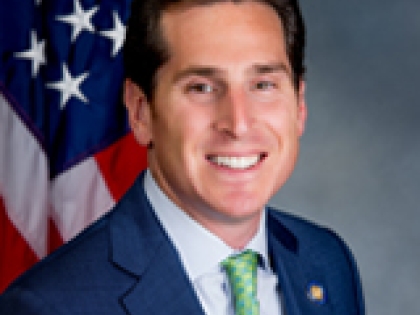
Legislation Spurred by Allegations Against Ex-NY AG Eric Schneiderman Gains Momentum in Albany
Legislation introduced in response to allegations of violent behavior of former New York Attorney General Eric Schneiderman toward women with whom he had sexual relationships that would make those actions eligible for criminal charges is gaining momentum among state lawmakers in New York.
The bill would add a definition of criminal sexual harassment to the state’s penal code, which would define the charge as a class A misdemeanor punishable by up to nearly a year in jail.
It was inspired by the alleged acts of Schneiderman, who was accused of committing violent acts against four women in a widely read article from The New Yorker last year that ultimately led to his resignation just hours after publication on the internet.
Assemblywoman Aravella Simotas, D-Queens, signed on to sponsor the legislation in her chamber this month, making it more likely to become law by the time the Legislature adjourns for the year in June. It was previously introduced by State Sen. Alessandra Biaggi, D-Bronx.
“When a survivor has the courage to come forward and report this type of abuse, it is unconscionable that the perpetrator would be able to evade all consequences for their actions,” Simotas said.
Biaggi said the legislation is intended to address acts of sexual harassment and domestic violence that may go unnoticed and, consequently, not be addressed. It would give victims an opportunity to confront their alleged abusers in ways they aren’t able to now, Biaggi said.
“Oftentimes these acts of abuse are not externally visible. However, the trauma and resulting physical and emotional wounds run deep and are long-lasting,” Biaggi said. “It’s critical that we continue to demonstrate in our legislation that the needs and recognition of the abused are first and foremost and that abusers must be held accountable for all of their malicious aggression.”
State Sen. Todd Kaminsky, D-Nassau, is sponsoring the bill with Biaggi in the Senate. He’s not unfamiliar with the section of state law the legislation aims to address; Kaminsky was previously a domestic violence prosecutor at the Queens District Attorneys Office.
“Sexually motivated physical abuse is serious and should be treated by our laws as such,” Kaminsky said. “Unfortunately, our state has a loophole in its penal law, allowing those who perpetrate violence to avoid prosecution. I am a proud cosponsor of legislation that would give prosecutors the tools they require to overcome these obstacles to justice.”
The bill is supported by Nassau County District Attorney Madeline Singas, a Democrat who was assigned as special prosecutor to investigate Schneiderman’s alleged conduct after he resigned from office. Singas was selected after Manhattan District Attorney Cyrus Vance Jr. agreed to step aside because of an ongoing probe by Schneiderman’s office into his handling of an investigation into sexual assault claims against former film mogul Harvey Weinstein.
Her office undertook a six-month investigation into the allegations from the article that resulted in no criminal charges against Schneiderman—not because the claims were untrue, but because there was no applicable state law that could be used to prosecute him.
The law currently only allows criminal charges in cases when the offender’s intent when hitting someone during sex is to “alarm, harass, or annoy” the victim. The victim also has to provide proof that they suffered “substantial pain.”
Schneiderman’s alleged actions did not meet those definitions, Singas said at the time. He was accused in the article of becoming physically violent during sex and on other occasions that either did not meet the definition of a criminal act or happened outside the statute of limitations for those charges.
The article included interviews and details from three women who claimed he physically abused them during their relationship. A fourth woman claimed Schneiderman slapped her when she rejected his advances.
One of the women interviewed claimed that, after they started dating, he began to slap her during sex without her consent. He also choked her and spat at her, the woman claimed. She described him as “a Dr. Jekyll and Mr. Hyde” figure based on the behavior, which is currently not chargeable under state law, according to Singas.
Another woman claimed that, at one point, Schneiderman slapped her so hard that she had to seek medical attention after the incident. The doctor removed dry blood from her ear, which was presumably there from the strike.
Two other woman, interviewed anonymously, claimed Schneiderman exhibited the same behavior toward them. One said Schneiderman, again, slapped her in bed without asking for her consent. Another claimed Schneiderman slapped her after she pulled away from him during a date.
But those alleged actions, while reprehensible, were not eligible for criminal charges under the current state law, Singas said. The legislation from Simotas and Biaggi would change that.
“This legislation is a way to protect survivors of intimate partner violence by holding abusers accountable,” Simotas said. “It is shocking that New York district attorneys do not have the legal means to bring justice to survivors of violence committed for sexual gratification unless the violence rises to extreme levels.”
The bill would add a new charge of sexual harassment that could be levied when a person, with the purpose of sexual arousal or gratification, and without consent, slaps, strikes, shoves, or kicks another person. The charge would be a class A misdemeanor, punishable by up to 364 days in jail.
Singas had urged lawmakers when she concluded her investigation last November to enact legislation verbatim to the bill introduced by Simotas and Biaggi. The charge would be subject to a two-year statute of limitations, which wouldn’t have extended to all of Schneiderman’s alleged victims, but it would have allowed charges to some extent.
“Victims of intimate partner violence deserve stronger legal protections, and I’m grateful to Assemblymember Simotas for carrying this important legislation,” Singas said. “This legislation criminalizes nonconsensual violence that is inadequately addressed by existing law.”
It goes without saying, but the legislation would also allowed prosecutors in New York to levy the charge against any perpetrator of domestic violence whose actions may not fit the statutory definition of such a crime. If passed, the bill would take effect this November.
The bill has been referred to the Codes Committee in both the State Assembly and Senate, but hasn’t moved since. Lawmakers are not in session this week, but could begin to move the bill when they return to Albany for the rest of this year’s legislative session next week. They’re scheduled to leave Albany for the year in June.
